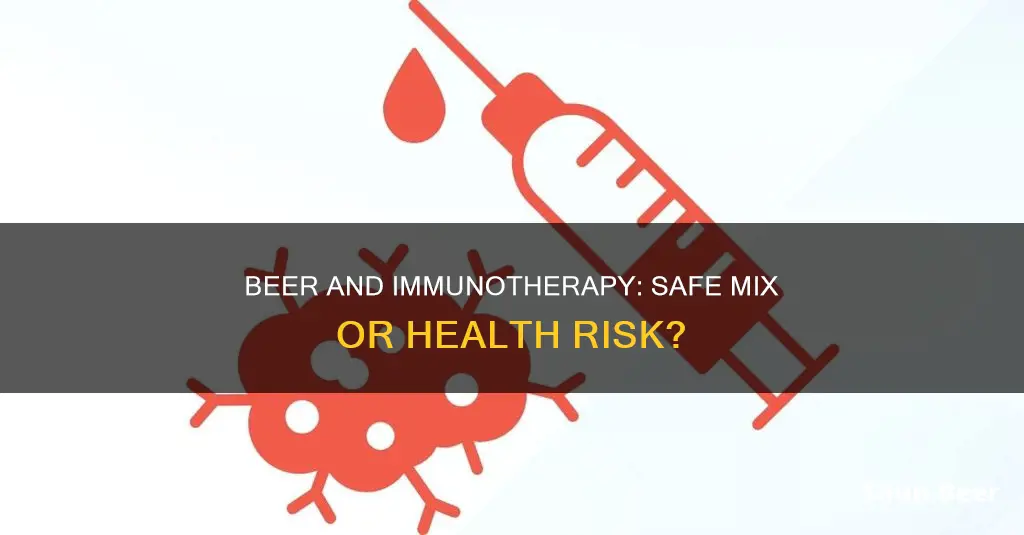
Drinking alcohol while undergoing immunotherapy treatment for cancer is a frequently asked question. While it may not be dangerous, it is not recommended due to the negative side effects it can cause. Alcohol is known to cause dehydration, nausea, and vomiting, which can worsen the side effects of immunotherapy. It is essential to consult a healthcare professional before consuming alcohol during cancer treatment, as it may interfere with the treatment's effectiveness and impact your overall health.
| Characteristics | Values |
|---|---|
| Is it safe to drink beer while having immunotherapy? | It is not recommended to drink beer while having immunotherapy as it can exacerbate side effects, such as dehydration, nausea and vomiting. |
| Alcohol can also affect the liver, which is used to break down immunotherapy drugs, and this could increase side effects from treatment. | |
| Alcohol is also a known carcinogen, which raises the risk of certain cancers and may affect how well cancer treatment works. | |
| It is best to seek advice from a healthcare professional before drinking alcohol while undergoing immunotherapy treatment. |
What You'll Learn

Alcohol's impact on bone marrow function
Alcohol can negatively impact bone marrow function. Bone marrow is responsible for producing white blood cells, red blood cells, and platelets. Alcohol-induced bone marrow damage can interfere with the healthy production of these cells.
Several studies have found that alcohol-dependent individuals exhibit heightened ineffective erythropoiesis, which is associated with impaired iron utilization. This can lead to a decrease in red blood cell production, resulting in anaemia. Alcohol can also cause changes in the bone marrow, such as vacuolated proerythroblasts, multinuclear erythroblasts, megaloblasts, and iron-containing plasma cells. These changes can affect the production of blood cells and impact the body's ability to transport oxygen and nutrients.
In addition, alcohol can suppress the immune system, which may interfere with the effectiveness of immunotherapy treatments. It is generally recommended that alcohol use be kept to a minimum or avoided completely while undergoing immunotherapy. This is because alcohol can increase the risk of developing certain types of cancer and may negatively impact the treatment's effectiveness.
The impact of alcohol on bone marrow function is an important consideration, especially for individuals undergoing cancer treatment or with existing blood and bone marrow conditions. It is crucial to consult with a healthcare professional to determine the safest course of action regarding alcohol consumption during immunotherapy.
Beer and Canker Sores: Is It Safe to Drink?
You may want to see also

Alcohol's sedative effects
Alcohol is a sedative with some stimulant effects. In small doses, it can increase your heart rate, aggression, and impulsiveness. However, in larger doses, alcohol typically causes sluggishness, disorientation, and slower reaction times, as it decreases your mental sharpness, blood pressure, and heart rate.
Alcohol is a depressant that slows down the central nervous system. It can help you feel relaxed, but it can also make you feel anxious. It is important to note that the effects of alcohol vary from person to person and are influenced by factors such as body chemistry, sex, weight, alcohol tolerance, and the amount of alcohol consumed.
When combined with immunotherapy, alcohol can worsen certain side effects of the treatment. This is because alcohol can cause dehydration, nausea, and vomiting, similar to the side effects of chemotherapy or radiation therapy. Additionally, alcohol can interfere with the healthy production of white blood cells, red blood cells, and platelets in the bone marrow. It can also cause liver damage, which may affect the effectiveness of immunotherapy medications that are processed by the liver.
In general, it is recommended to avoid alcohol while undergoing immunotherapy treatment. It is always best to consult with a healthcare professional to determine if it is safe to consume alcohol during treatment and to discuss the potential risks and side effects.
Liquid Diets and Beer: Is It Allowed?
You may want to see also

Alcohol and irritation to the stomach
Alcohol can irritate the gut, including the stomach. It can increase the amount of acid in the stomach, which can irritate and erode the stomach lining, causing a condition called gastritis. This can lead to painful stomach ulcers, which can be fatal.
Drinking too much alcohol can cause nausea, sickness, and loss of appetite. If your stomach lining is inflamed, you might not absorb nutrients from food. This can lead to a deficiency in several nutrients, including proteins, vitamins, and minerals.
Alcohol can also cause acid reflux, where acid rises from the stomach into the throat, causing an uncomfortable burning sensation known as heartburn.
If you are undergoing cancer treatment, alcohol can worsen the side effects of radiation therapy or chemotherapy, including nausea and oral mucositis or mouth sores.
It is generally recommended that you avoid drinking alcohol while undergoing cancer treatment, especially if you have blood and bone marrow cancers, as alcohol interferes with the production of blood cells and platelets.
Passengers and Beer: Drinking Laws You Need to Know
You may want to see also

Alcohol's effect on the liver
The liver is one of the body's most complex organs, with functions including filtering toxins from the blood, aiding digestion, regulating blood sugar and cholesterol levels, and helping fight infection and disease.
When you drink alcohol, it is primarily the liver's job to break it down and remove it from the body. This process creates substances that are more harmful than alcohol. Large amounts of these substances can damage liver cells and cause serious liver disease.
Excessive alcohol consumption can significantly affect the liver and contribute to three types of liver disease:
- Excessive buildup of fat in the liver, also known as fatty liver or hepatic steatosis.
- Inflammation of the liver or alcoholic hepatitis.
- Replacement of normal liver tissue by scarred tissue or alcohol-related cirrhosis.
Fatty liver is the earliest stage of alcohol-related liver disease and is also the most common. Most people with fatty liver don't experience any symptoms, although they may have an enlarged liver or mild discomfort in the upper right side of the abdomen. This is a preventable disease that is reversible if treated early by stopping drinking.
About one-third of heavy drinkers develop alcoholic hepatitis, where the liver becomes inflamed and swollen, and liver cells are destroyed. This hepatitis varies in severity and patients may experience jaundice, fever, nausea, vomiting, and abdominal pain. The mild form can last for years and lead to more liver damage unless the patient stops drinking. Severe alcoholic hepatitis occurs suddenly, usually after binge drinking, and can be life-threatening.
Of heavy drinkers, 10-20% develop cirrhosis, a serious and usually irreversible condition that develops after 10 or more years of drinking. Because scar tissue builds up and replaces most of the liver cells, the liver cannot work properly and may fail. Cirrhosis can lead to fatal liver failure or liver cancer.
It's important to note that liver diseases caused by alcohol improve or can be prevented by reducing or giving up alcohol.
In terms of safe drinking levels, moderation is key. Men are advised to have no more than two drinks per day, while women should have no more than one. Binge drinking is defined as consuming five or more drinks within two hours for men, and four or more drinks for women.
Pregnancy and Beer: Is Dealcoholized Beer Safe?
You may want to see also

Alcohol's impact on cancer treatment
Alcohol is a well-known carcinogen that negatively impacts cancer treatment in several ways. Firstly, it can interfere with the healthy production of white blood cells, red blood cells, and platelets in the bone marrow, which is particularly concerning for patients with blood and bone marrow cancers. Alcohol also acts as a sedative, exacerbating fatigue and enhancing the effects of pain and nausea medications. Additionally, it irritates the stomach lining and gastrointestinal tract, similar to the side effects of radiation and chemotherapy.
The liver plays a crucial role in metabolising both alcohol and chemotherapy drugs, and alcohol consumption can add stress and potentially cause permanent damage to this organ. Alcohol also negatively affects the immune system, which is crucial in fighting cancer. It suppresses the immune system, potentially hindering the effectiveness of immunotherapy treatments that rely on stimulating the immune system to detect and fight cancer cells.
Alcohol can worsen the side effects of cancer treatments, including nausea, dehydration, and mouth sores. It increases the risk of additional cancer diagnoses and may also increase the risk of second primary cancers. For these reasons, it is generally recommended to avoid alcohol during cancer treatment.
Alcohol consumption is linked to an increased risk of several types of cancer, including head and neck cancers, esophageal cancer, liver cancer, breast cancer, and colorectal cancer. Even small amounts of alcohol increase cancer risk, and it is advised that those who do not drink should not start. For those who choose to drink, moderation is key, with recommendations of no more than one drink per day for women and no more than two drinks per day for men.
Beer and pH Balance: Is It Safe to Drink Beer?
You may want to see also
Frequently asked questions
It is not recommended to drink beer or any other form of alcohol while undergoing immunotherapy as it can exacerbate side effects by causing dehydration, nausea, and vomiting. Alcohol can also interfere with the treatment and affect how well it works.
It is best to avoid alcohol altogether during immunotherapy treatment. However, if you wish to continue drinking, it is important to seek advice from your healthcare provider, who can guide you on what is safe and how alcohol may affect your treatment.
Alcohol can cause liver inflammation and impair the breakdown of chemotherapy drugs, increasing their side effects. It can also irritate mouth sores or make them worse. Additionally, alcohol is a known carcinogen, increasing the risk of certain types of cancer.
Alcohol can suppress the immune system, possibly interfering with how immunotherapy medications work. This could lead to the treatment being less effective and potentially worsening its side effects.







